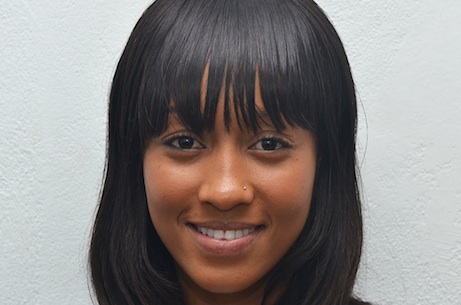
Jerelle Joseph's PhD will use atomistic modelling to investigate variable pathogens such as influenza and HIV.
Jerelle Joseph believes passionately in the power of teaching and of science. Her ambition is to raise the level of science in the Caribbean and show science students there that their work can have international impact.
“A lot of people in the Caribbean think that if you study science you will just end up as a school science teacher. Many students don’t focus on publishing their work in good journals. They don’t feel they are on a level playing field with other universities, but we can do work which is just as good and has impact,” she says.
“Why can’t we organise conferences and bring scientist to the Caribbean? Why can’t we have our own scientific journals? Science could contribute a lot to our development too.”
Jerelle will be arriving at the University of Cambridge to do a PhD in Chemistry this autumn.
She was encouraged to apply to the University by her supervisor at the University of the West Indies, Professor Sean McDowell. He had studied at Cambridge and was keen for Jerelle to apply. “He was advocating for Cambridge from day one and talked me through the application process,” she says. She was also impressed by the work being done by Professor David Wales in the Department of Chemistry whose research team she will join. “I read up on what he was doing using codes to look at problems such as protein structures. I have always been interested in how computational chemistry might be used to solve real life problems,” she says.
For her PhD she will use atomistic modelling to investigate variable pathogens such as influenza and HIV. She says: “Rapid mutations of these viruses pose a huge problem for vaccination. Our aim is to predict the structures of these pathogens and to link this to their antigenic properties. My hope is that our findings can be applied in the development of viable vaccines for these viruses.”
Childhood
Jerelle was brought up in the small village of Vieille Case in the countryside of Dominica. Her mother was a nurse and her father was a “jack of all trades”, dabbling in everything from teaching to politics to fishing. Jerelle is the youngest of four girls.
Her mother worked in Dominica’s second largest town, Portsmouth, and so sent her children to a government primary school there rather than to the village school. “We were probably the first children in the village not to go to school there,” she says.
Jerelle and her siblings had to get up at 6.30am to get the bus to Portsmouth. When they started at secondary school they sometimes had to wake up even earlier at 5.30am as the bus driver also did tours and had to meet tourists from the cruise ships. Jerelle would always do after school activities and often returned home late or stayed with her aunt or her friend's family in Portsmouth. Not only was she a keen athlete, playing netball, football and basketball, but she was in the savings club, the dance team, the spelling team and the drama club. She was also head girl.
She was a good all round student, but as one of the brightest in her school she was encouraged to do science. Her parents were very supportive of her education. Neither had even been to secondary school because it was reserved for the privileged when they were growing up. Her mother was encouraged by her sister to go into nursing. Her father was asked to be a teaching assistant despite his lack of formal education. “He had tons of books and was always reading something. He put a big emphasis on school. He would not help us with our homework projects because he wanted us to do the work ourselves,” says Jerelle.
In part because of growing up with such a positive attitude towards education, Jerelle decided to work as a teacher for a year before she went to university so she could apply for a scholarship. Without it she would not have been able to afford university unless she worked for several years and saved up. She only applied to teach at her old high school. “I always liked explaining things to people at school and I wanted to see what teaching was like. I wanted to see if it was something I could do in the future,” she says. She taught chemistry, physics, maths and integrated science. “It was a huge challenge,” she says. She had to prepare students for their end of school exams and threw herself into the job, staying up until 2am doing lesson plans and giving extra classes at school, including laboratory sessions.
“I wanted to make sure they got the best education they could,” says Jerelle. “My mum used to say why are you killing yourself when you could make better money elsewhere, but I loved it. I used to think it was just me liking to explain things, but it was more than that. One of my pupils said he hated maths. I said I promised he would pass maths if he promised to work hard. I tried to make the subject so exciting and linked maths to real life examples. I didn’t see the results immediately, but in the first term he was struggling. By the second he was doing a little better and by the end of the year he had passed maths. I was so excited I wanted to cry. He was from my village. At the end of my first year at university he sent a message on Facebook to say he had passed the end of school exams. It made my year. I saw the impact I could have on people’s lives, that I could make people believe they could do things. That is what I love about teaching.”
Family bereavement
In September 2009 Jerelle started her three-year degree in chemistry. In her second year her mother fell ill with cancer. She had to travel home from her campus in Barbados several times. She was due to sit important exams when she was told her mother’s cancer had worsened. She filed for an exemption and went home, but her mother told her to return to do her exams. “She said she would still be alive when I got back and that she believed in me. Going back was very difficult,” says Jerelle. She returned to Dominica after her exams and her mum died shortly afterwards. Jerelle was unsure if she should take a semester off, but was worried about how this would affect her studies. “It hadn’t really hit me,” she says. “My mum would call me every day. Not getting that phone call was the absence I felt at university, but when I came back in the summer then it became real.”
Jerelle, who was a public relations officer for her student halls, worked as a laboratory assistant over the summer vacation of her first and second years at university. At the end of the first term of her third year, however, her family suffered another huge shock when her father died suddenly. It was just at the time when Jerelle was deciding whether she wanted to apply to graduate school outside the Caribbean. “When he died I thought very deeply about whether I wanted to leave the Caribbean so soon,” she says. “It was a lot for my sisters and me to deal with.”
One of her lecturers encouraged her to apply for the University of West Indies’ graduate school. In the last semester of her undergraduate degree she had done independent research on halogen bonding, working with Professor McDowell. It is a relatively new field and Jerelle was Professor McDowell’s first student to focus solely on halogen bonding, the non-covalent chemical interaction that occurs between a halogen atom and a Lewis base such as ammonia. The field has potential for application in areas such as crystal engineering and drug design.
Jerelle decided to apply to continue the research and broaden it to encompass sigma-hole bonding for an MPhil in Chemistry starting in 2012. She says her masters research has been fairly theoretical, given that halogen bonding is an emerging field. She adds: “From our research we believe a lot of generalisations are being made about sigma-hole and halogen bonding and that certain things do not fit with these generalisations.”
Jerelle plans to return to the University of West Indies to teach after completing her PhD. She says: “My dream is to become a professor of computational chemistry and to lead my own research group in the Caribbean. I hope to raise the standard of scientific research in my region and to inspire others to do the same.”

Jerelle Joseph
- Alumni
- Dominica
- 2014 PhD Chemistry
- Churchill College
I grew up in the island of Dominica, in a village called Vieille Case. In 2012, I graduated from the University of the West Indies with a BSc. in Chemistry and Mathematics. I then pursued an MPhil. in Chemistry at the UWI, under the supervision of Prof Sean McDowell. In 2018, I completed my PhD in Chemistry (Department of Chemistry, Cambridge) under the supervision of Prof David Wales FRS. For my PhD work, I developed and tested computational methods to study protein folding. In particular, I worked on a coarse-grained model for proteins, developed an approach for sampling large-scale rearrangements in proteins, and characterised a disordered receptor protein implicated in HIV infection. After my PhD, I joined the group of Dr Rosana Collepardo-Guevara (Department of Physics, Cambridge) as a research associate; focusing on developing models to probe genome organisation. I am currently a Junior Research Fellow at King's College Cambridge, where I am developing multiscale computational approaches to interrogate how cells organise their contents via phase separation.
Links
https://www.carischolar.com
https://twitter.com/jerelleaj
https://www.linkedin.com/in/jerelle-a-joseph












